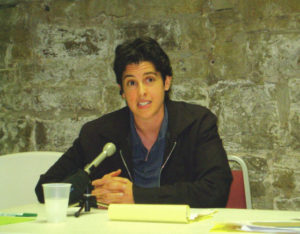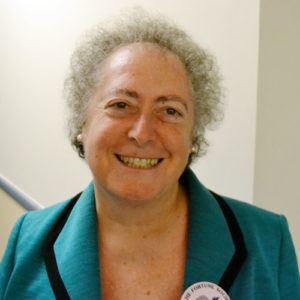Podcast: Play in new window | Download
The Case Of Bernina Mata And Clemency
In 1998, Bernina Mata was convicted of first-degree murder in the killing of John Draheim, who she’d met at a local bar. After he tried to rape her, she fought back in defense and stabbed him. At trial, prosecutors portrayed Mata as a man-hating lesbian, and literally described her as a “hard core lesbian” who they claimed killed because the victim made an unwanted sexual pass at her. They claimed Mata’s sexuality was the motive and showed the jury books from her apartment—Call Me Lesbian, Homosexualities, and Best Lesbian Reading —to support their theory. Prosecutors claimed that “a normal heterosexual person would not be so offended by the (victim’s) conduct as to murder.”
The jury found Mata guilty and sentenced her to death. In 2003, her sentence was commuted from death to life in prison after former Governor George Ryan commuted the sentences of everyone on death row in that state in response to a historic organizing clemency campaign. Now, Mata’s defense team – are asking Illinois Governor J.B. Pritzker to grant her release from prison. They filed a petition for executive clemency, saying her case was plagued by racism and anti-lesbian oppression.
Guests – Attorney Joey Mogul and Deana Lewis, Joey Mogul is a partner at the People’s Law Office and has represented Mata since 2002. Deana Lewis is an Associate Director at the Institute for Research on Race and Public Policy at the University of Illinois at Chicago. Deana is involved in the work of several Chicago community and national organizing collectives including Love & Protect, Just Practice Collaborative, and Survived & Punished.
—-
Joanne Page: The Fortune Society
Each year in the United States, more than 600,000 individuals are released from state and federal prisons. A staggering 6.9 million people are on probation, in jail, in prison, or on parole. On top of that, an additional nine million persons cycle through local jails.
As grim as these numbers are, more sobering is the fact that more than two-thirds of prisoners are rearrested within 3 years of their release. Half of those are reincarcerated.
Why is this recidivism rate so high? It has much to do with the failure of re-entry support programs. We have the world’s largest carceral state but no effective support system for people finishing their sentences and re-entering society. Consequently, crime rates soar, more individuals are victims of crime, families and communities suffer when we fail to deal with the consequences of over-incarceration. When reentry fails, the costs are high — more crime, more victims, and more pressure on already-strained state and municipal budgets. There is also more family distress and community instability. Community reintegration impacts several larger areas such as community health, education, employment, family relationships and housing.
In every aspect, failure to support recently released individuals is costly to society.
Guest – JoAnne Page is the President and CEO of the NY-based Fortune Society. Policymakers and researchers frequently cite the organization for its pioneering work. A graduate of Yale Law School, Page cultivated and created many of Fortune’s signature programs including substance abuse treatment, counseling, family services, HIV/AIDS health services, mental health programs, job training and employment services, parenting initiatives, and supportive and permanent housing. Page is a leading authority on issues including prison reform, solitary confinement, wrongful convictions, the over-incarceration of young men of color, sentencing reform, violence prevention, homeless housing, effective policing strategies, legislation, sex offender registries, and more.
————————




